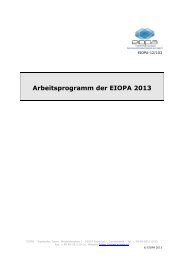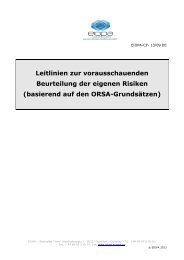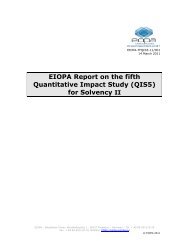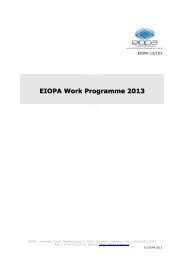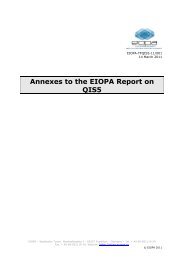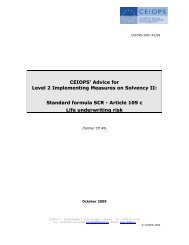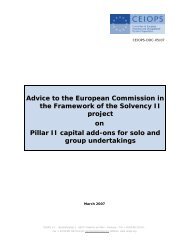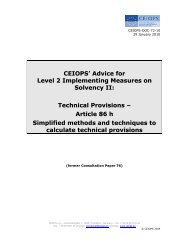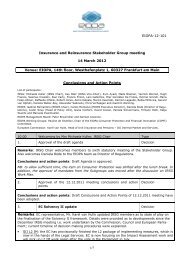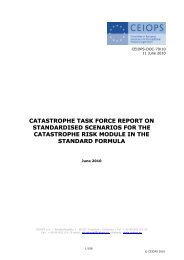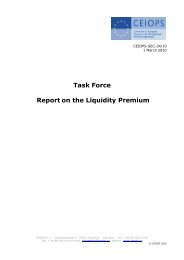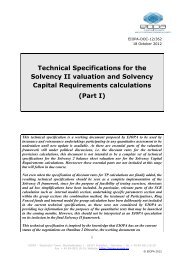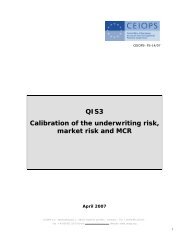Answers to the European Commission on the ... - Eiopa - Europa
Answers to the European Commission on the ... - Eiopa - Europa
Answers to the European Commission on the ... - Eiopa - Europa
You also want an ePaper? Increase the reach of your titles
YUMPU automatically turns print PDFs into web optimized ePapers that Google loves.
(III) Supervisory Review Process of groups<br />
Extract from <str<strong>on</strong>g>the</str<strong>on</strong>g> Call for Advice:<br />
Would a supervisory review process (SRP) for insurance groups need <str<strong>on</strong>g>to</str<strong>on</strong>g> be set<br />
up, in particular <str<strong>on</strong>g>to</str<strong>on</strong>g> take account of risks not existing <strong>on</strong> a solo level, but existing<br />
at a group level and that are not taken in<str<strong>on</strong>g>to</str<strong>on</strong>g> account in Pillar I? (See also <str<strong>on</strong>g>the</str<strong>on</strong>g> Call<br />
for Advice <strong>on</strong> SRP)<br />
Should supervisi<strong>on</strong> be applied at group level and how? What would that exactly<br />
entail including advantages/disadvantages (cf. separate Calls for Advice <strong>on</strong><br />
supervisory powers, solvency c<strong>on</strong>trol levels, SRP)?<br />
Explana<str<strong>on</strong>g>to</str<strong>on</strong>g>ry text<br />
Aims <str<strong>on</strong>g>to</str<strong>on</strong>g> be pursued when supervising groups<br />
18.49 It is not uncomm<strong>on</strong> <str<strong>on</strong>g>to</str<strong>on</strong>g> find in <str<strong>on</strong>g>the</str<strong>on</strong>g> group c<strong>on</strong>text that it is actually <str<strong>on</strong>g>the</str<strong>on</strong>g><br />
parent undertaking that lays down <str<strong>on</strong>g>the</str<strong>on</strong>g> business strategy, as well as<br />
sets up internal c<strong>on</strong>trol and risk management mechanisms for <str<strong>on</strong>g>the</str<strong>on</strong>g><br />
entire group. Articles 10.3 of <str<strong>on</strong>g>the</str<strong>on</strong>g> Recast Life Directive, as well as Art.<br />
9.3 of <str<strong>on</strong>g>the</str<strong>on</strong>g> Third N<strong>on</strong>-Life Directive require insurance undertakings<br />
(solo) <str<strong>on</strong>g>to</str<strong>on</strong>g> have adequate internal c<strong>on</strong>trol systems in place. The IGD<br />
does not have a complete approach <str<strong>on</strong>g>to</str<strong>on</strong>g> internal c<strong>on</strong>trol, but it addresses<br />
<str<strong>on</strong>g>the</str<strong>on</strong>g> issue of internal c<strong>on</strong>trol as regards supplementary supervisi<strong>on</strong> of an<br />
insurance group as follows:<br />
• regarding <str<strong>on</strong>g>the</str<strong>on</strong>g> informati<strong>on</strong> needed for <str<strong>on</strong>g>the</str<strong>on</strong>g> purposes of calculating<br />
<str<strong>on</strong>g>the</str<strong>on</strong>g> adjusted solvency requirement, Art. 5.1 requires that<br />
insurance groups shall have in place adequate internal c<strong>on</strong>trol<br />
mechanisms for <str<strong>on</strong>g>the</str<strong>on</strong>g> producti<strong>on</strong> of any data and informati<strong>on</strong>;<br />
• regarding intra-group transacti<strong>on</strong>s, Art. 8.2 (as modified by<br />
FCD), requires that insurance groups have in place adequate risk<br />
management processes and internal c<strong>on</strong>trol mechanisms in order<br />
<str<strong>on</strong>g>to</str<strong>on</strong>g> m<strong>on</strong>i<str<strong>on</strong>g>to</str<strong>on</strong>g>r and c<strong>on</strong>trol intra-group transacti<strong>on</strong>s.<br />
18.50 The FCD has a more complete approach <str<strong>on</strong>g>to</str<strong>on</strong>g> internal c<strong>on</strong>trol and risk<br />
management. Article 9 sets out more specific requirements for internal<br />
c<strong>on</strong>trol mechanisms and risk management processes.<br />
18.51 Since a parent undertaking can exercise dominant influence <strong>on</strong> o<str<strong>on</strong>g>the</str<strong>on</strong>g>r<br />
group undertakings, including <str<strong>on</strong>g>the</str<strong>on</strong>g> possibility <str<strong>on</strong>g>to</str<strong>on</strong>g> restructure <str<strong>on</strong>g>the</str<strong>on</strong>g> capital<br />
of <str<strong>on</strong>g>the</str<strong>on</strong>g> subsidiaries, <str<strong>on</strong>g>the</str<strong>on</strong>g>re is an unquesti<strong>on</strong>able need <str<strong>on</strong>g>to</str<strong>on</strong>g> ensure that <str<strong>on</strong>g>the</str<strong>on</strong>g><br />
same capital of <str<strong>on</strong>g>the</str<strong>on</strong>g> subsidiaries is not artificially used within a group <str<strong>on</strong>g>to</str<strong>on</strong>g><br />
cover risks simultaneously in several group companies (double-gearing<br />
of capital).<br />
18.52 An unregulated parent undertaking and its unregulated subsidiaries<br />
may incur similar counterparty and market risks as regulated group<br />
213



